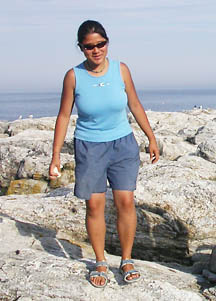Summer research on island leads Cornell junior to prestigious honor
By Krishna Ramanujan

ITHACA, N.Y. -- Last summer, Cornell University junior Sui-Ling Evelyne Kuo lived the good life on Appledore Island, the 95-acre home of Shoals Marine Laboratory in the Gulf of Maine. She spent most of her time studying predator and prey interactions in small freshwater invertebrates. Aside from a fascinating way to spend a summer, Kuo's work led to one of three Best Student Presentation Awards at the 34th Annual Benthic Ecology Meeting, April 6-10, at the Virginia Institute of Marine Science in Williamsburg, Va.
For each of the three days of presentations by students, faculty members and researchers at the meeting, a single student presentation was honored. Kuo, competing against mostly graduate students, won the award for the best student lecture for April 8. A total of 140 students made presentations.
The meeting served as a forum for more than 600 participants to update colleagues on the latest research developments in the field of benthic ecology, the study of organisms that live on sea or lake bottoms and the interactions between these organisms and their environment.
To conduct her research, Kuo spent nine weeks eating, sleeping and working on Appledore, six miles off Portsmouth, N.H. Shoals caters to undergraduates and is jointly managed by Cornell's College of Agriculture and Life Sciences and the University of New Hampshire at Durham. Kuo's research at Shoals was supported by a stipend through Cornell's Hughes Scholars Program, which offers grants to some 80 sophomore and junior biology majors each summer.
Kuo examined the eating habits of invertebrates, such as water boatman, midge larvae, ostracods (seed shrimp) and daphnia in freshwater rock pools that lie above tide lines and away from ocean waves. Each day, Kuo spent 12 hours in the lab recording data hourly on the invertebrate specimens she had sampled from some of the approximately 500 local pools.
Scavenging, Kuo said, was more prevalent than predation as a means of finding food in the pool systems she studied.
"These very small ponds dry up regularly over the season, and so the desiccation creates mass death and hence there is a lot of carrion available," said Kuo, a biology major concentrating on ecology and evolutionary biology in the College of Arts and Sciences, and a native of Hong Kong. "I found the survivors feasted on dead carrion." She hypothesized that under these circumstances, it was easier and required less energy for survivors to scavenge than to prey on live, moving food.
Kuo will be returning to Shoals again this summer and plans to publish a paper on the subject. Her faculty advisers included James G. Morin and Nelson Hairston Jr., both professors in Cornell's Department of Ecology and Evolutionary Biology, and James Haney, a professor at the University of New Hampshire's Department of Zoology.
Media Contact
Get Cornell news delivered right to your inbox.
Subscribe